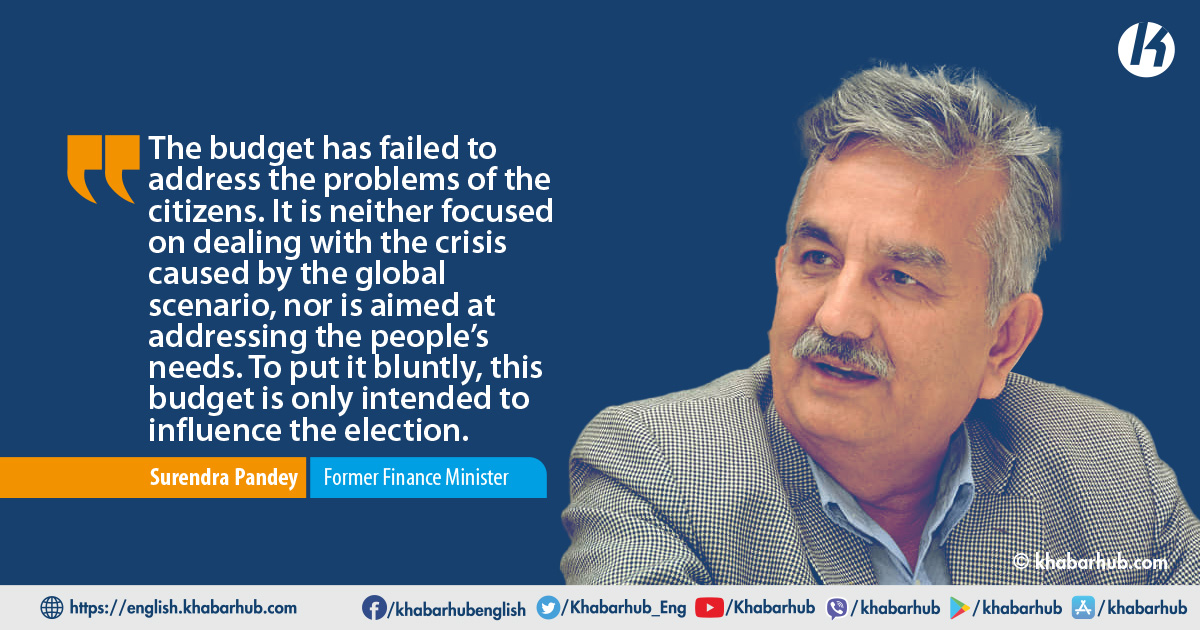0%

KATHMANDU: The pros and cons of the fiscal budget unveiled by the government this week have been debated in the parliament.
Finance Minister Janardan Sharma brought a budget of Rs 1.79 trillion. Until some time ago, there were comments that the country was facing an economic crisis. However, no such rumor has been heard since the budget was unveiled.
Leaders of the main opposition party, the CPN-UML, have been sharply critical of the budget.
Former Finance Minister Surendra Pandey is one of the UML leaders to criticize the budget. Khabarhub’s Dhiraj Basnet held a conversation with former Finance Minister Pandey. Excerpts:
As a former Finance Minister, how do you view the budget made public by the government? What does the overall budget look like?
If the Nepal Rastra Bank’s statement is to be considered, we are at a critical juncture in history in terms of foreign exchange reserves. We have 9.61 billion in reserves.
It has fallen by 2.7 billion since last July. Moreover, 120 million to 150 million is declining from our reserves each month. And, this has continued.
The dollar reserve is declining each day. There is no money in the market, and banks are raising interest rates.
As a result, entrepreneurs are frustrated and discouraged. They seem to be confused about what to do.
Looking at the international scenario, it has gone through a difficult situation. A country like the United States has been hit by the biggest inflation in 40 years. It is facing inflation of 7.5 percent. The European Union, too, is hit by 7 percent inflation.
The United States is urging citizens to invest abroad to return their investments.
China’s economy has also shrunk due to bitterness toward the United States and the Covid-19 pandemic.
Several countries have started imposing bans on the exports of food, construction materials, and other goods.
Indonesia has banned the export of palm oil. Likewise, neighboring country India has already banned the import of wheat and sugar.
The World Food Program is warning that there could be famine in the world. The problem is so serious.
However, the budget brought by the government has failed to address any of these issues.
As a result, the budget has become more of a problem rather than a problem-solving tool.
Are you trying to say that this budget does not address the crisis caused by the global scenario and the economic challenges that Nepal is facing?
Yes, the problems faced by the citizens are on one side. The crises caused by the global scenario are on the other side.
However, the budget has neither tried to address the problems of the citizens nor is it focused on dealing with the crisis.
To put it bluntly, this budget is only intended to influence the election.
Nepal’s economy is in crisis. However, the budget has absolutely shown no concern about how to overcome the crisis. The current budget also cannot stop inflation.
Isn’t this a continuation of the tendency (by the opposition) of criticizing the budget?
Definitely not. I am talking to you based on facts. There is no reason to be prejudiced.
You may be aware of how the world is struggling with the economic crisis. Many countries have already banned the export of goods.
However, in our country where foreign exchange reserves are weak, there is still no focus on reducing imports and increasing exports.
When creating a self-reliant economy has not been a priority, how could we appreciate the budget?
You, as a Finance Minister, also brought the budget. Why prohibited you from focusing on building a self-reliant economy then?
What one has to understand is that the time and situation were different when we were in government. The current crisis was not there when we were in government.
There was no pressure from foreign exchange or liquidity concerns. There was no war between Ukraine and Russia.
Yes, the country needs to be made self-reliant, whether there is a global crisis or not.
That effort was being made when we were in government. Now that work had to be carried out with more urgency. However, the government did not pay much attention.
Doesn’t the increase in the budget for agriculture and energy means that the government is trying to increase productivity and focus on exports?
When it comes to exports, the government has put a little emphasis on two things. Electricity is one. This year we exported 39 megawatts of electricity.
But the condition that India put forward while buying electricity is that electricity is a strategic commodity and not a normal product.
India has said it will buy 325 MW of electricity during Prime Minister Sher Bahadur Deuba’s visit to India.
But its basis and criteria are not clear. Moreover, we can sell electricity for four to five months during the rainy season. After that, we have to purchase from India itself.
There is no clear policy on all these issues.
The government has adopted a policy of taxing up to 60 percent on electric vehicles. Is UML in favor of this policy?
The government does not seem to have any balance in this regard either. The policy taken by the government is contradictory. On the one hand, it means reducing imports of petroleum products, on the other hand, it has imposed taxes on electric vehicles. Emphasis is placed on the import of vehicles running on petroleum products because it gets taxes.
Are you trying to say that the budget is not pro-people?
Yes, this budget will surely lead to an accident. This could deepen the crisis further. It will not address the current problems.